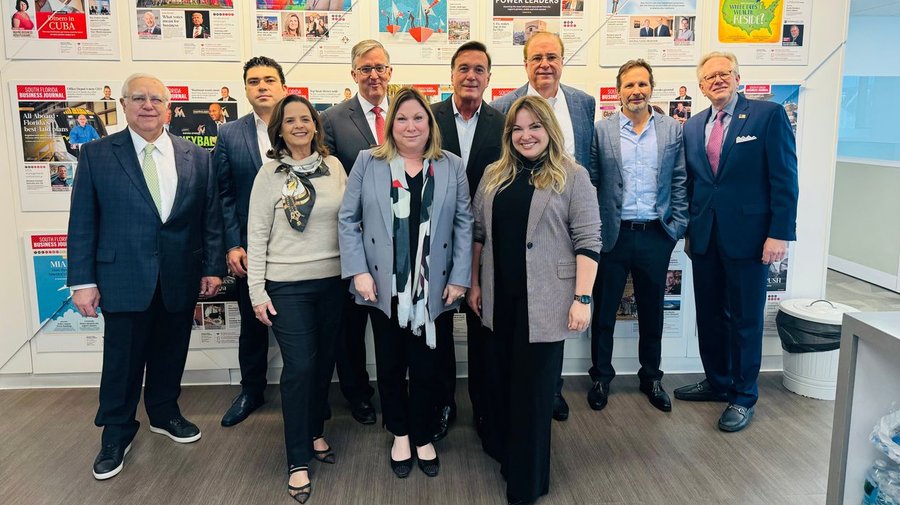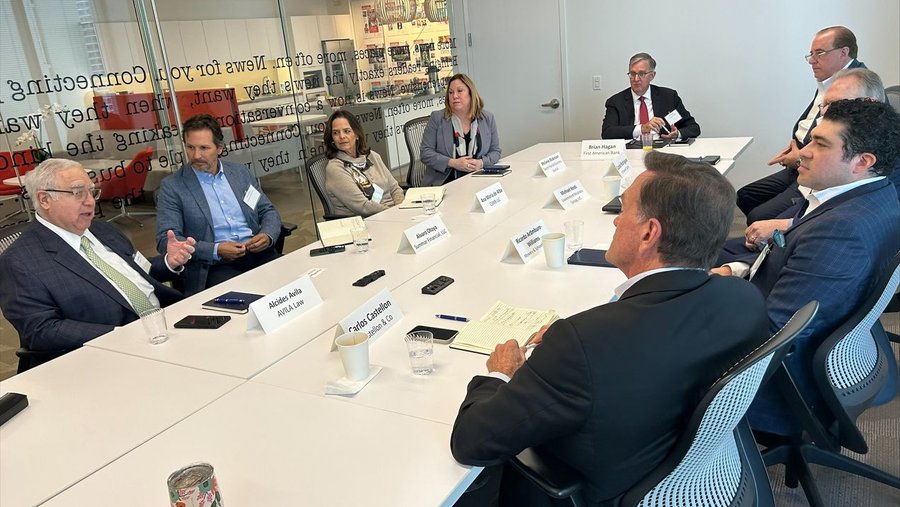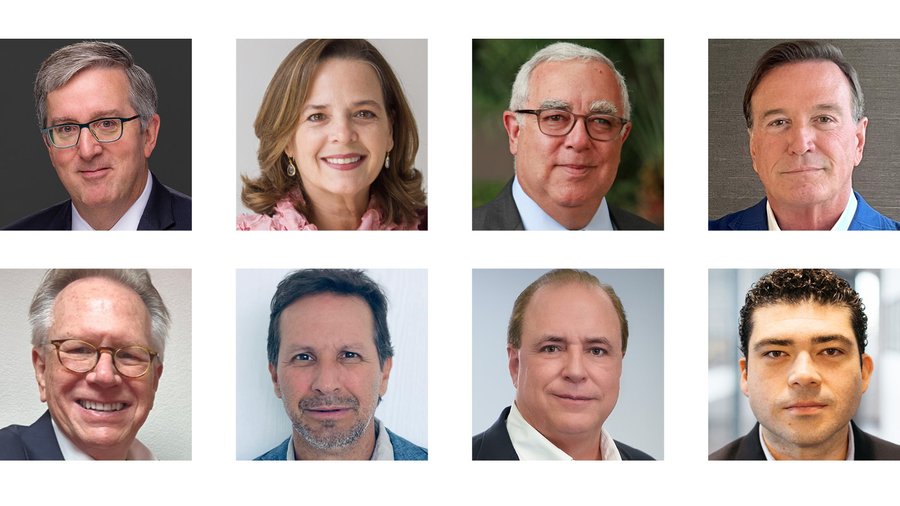The U.S. tax code provides foreign nationals a path to America’s financial safe haven, investment programs and tax benefits for business opportunities.
These rules can be complicated to follow, especially for foreign business owners. Yet with the guidance of attorneys, accountants, financial advisors, bankers and other skilled professionals, international businesses can maximize these opportunities while mitigating risks often seen in more volatile overseas markets.
A recent roundtable conversation hosted by the South Florida Business Journal and First American Bank convened a group of legal, advisory and financial professionals to explore how international business owners can navigate these paths.
Brian Hagan, Florida market president of First American Bank and moderator for the discussion, focused on the process international businesses must take to establish the required legal and financial structures to conduct in the U.S.
Alcides Avila, founding partner with Avila Law, believes it begins with the business structure foreign nationals elect to establish. Certain structures provide benefits to the owners and especially domestic partners seeking investment partners, he said.
Beyond the appeal of U.S. law, no market is more attractive than Miami and South Florida, Avila said. As they seek both business and lifestyle returns, foreigners also can enjoy improved financial and tax incentives, panelists agreed.
Navigating U.S. reporting rules
Beyond the rules imposed by the U.S. Internal Revenue Service, other federal agencies have their own rules to be followed. This year, the
U.S. government implemented the Corporate Transparency Act (“CTA”). It requires heightened reporting transparency for certain U.S. and international companies and their beneficial ownership operating in the U.S., said Ana Maria de Alba, founder and CEO of CSMB International, Inc., and co-founder of RiskRator, LLC.
Enforced by the Financial Crimes Enforcement Network (FinCEN) of the U.S. Department of the Treasury, rules regarding beneficial ownership information (BOI) reporting seek to thwart domestic and international financial crimes.
The rules point to an increasingly complex system of filings, which can stymie bankers who don’t have all their customers’ required information, Hagan said.
Another consideration is who files the documents for a new organization, and who may be the title holder. With overview by the U.S. Office of Foreign Asset Control (OFAC), a company (a legal entity) may end up being placed on a “Specifically Designated Nationals” or SDN list, which is a list composed of terrorists and narcotics traffickers, among others, when more than a 50% of said entity is owned by an individual who is in the SDN list, and the implications are clear. For example, resulting financial transactions may be blocked by the bank, de Alba said.
The rules grow even more complicated for organizations that may want to open operations, whether international companies in the U.S. or U.S. companies opening abroad, Avila said. To simplify matters, some may choose subsidiaries, or establishment of an LLC, the “cleaner, simpler corporate structure,” he said.
Under the CTA, however, failure to register such an organization is a criminal violation.
“All domestic and foreign companies registered to do business in the U.S. will need to file the new FinCEN BOI requirements of identifying information about the individuals who directly or indirectly own or control a company,” said Carlos Castellon, managing partner with CPA firm Castellon Halloun, PL.
“A person who willfully violates the BOI reporting requirements may be subject to civil penalties of up to $500 for each day that the violation continues. That person may also be subject to criminal penalties of up to two years imprisonment and a fine up to $10,000. Companies that existed before January 1, 2024, have until January 1, 2025, to report. If the company was created or registered on or after January 1, 2024, and before January 1, 2025, then it must file its initial BOI report within 90 calendar days after incorporating or registering,” he said.
Historically, the U.S. has been among the world’s least transparent countries with regard to registering a business or disclosing beneficial ownership. The corporate world has changed. What had been a tax haven cloaked in secrecy today has been opened with the CTA, Avila said.

The details bankers need
Bankers now need to understand both the source of wealth and the source of funds. Where did you get money to be able to create, fund, and invest in your business? How did you build the business? The more a bank knows about the customer, the better they will be able to sell financial services and products to that customer, but also monitor their activity without constantly blocking transactions to understand the nature of said transactions, de Alba said.
Sharing such information about finances and current status, assets and wealth with bankers can help protect assets and wealth. It may begin with a conversation with legal, accounting or financial advisors to help the principal to clearly communicate their status to their banker, she said.
For a banker, the more complex the legal structure, the more challenging the compliance component becomes. “Which is why we always try to partner with the best international tax advisors,” Hagan said.
“The bank needs to understand all of the layers of a business structure,” de Alba said. “The answers (business principals) provide aren’t always eloquent. They need to be able to explain to their banker all the reasons why these structures exist. At the end of the day, we tell our clients it has to make business sense. If it makes business sense, then you can explain it in a way the bank will understand why all those layers. Not just, ‘because my attorney told me.’”
It can be as easy as the attorney, CPA or financial advisor drafting a letter explaining the intent to “set bankers at ease,” Hagan commented. “Bankers and advisors are expected to be able to explain that to their customers.”
It also affects suppliers and customers, he added. Imagine a U.S. entity doing business with a Turkish company owned by a Russian oligarch. Alvaro Otoya, president of Summar Financial, LLC, a factoring services company that specializes in supplying working capital to companies in need of immediate liquidity, told the story of an El Salvadoran business selling to Russia. Because of the fear of OFAC, the banker involved didn’t want to manage the business, he said. Summar was able to secure financing through Ecuador.
“You may not have a red flag,” he said. “But the country could have an embargo, or the bank doesn’t want to do business with Russia or China.”
What tomorrow holds
What’s the path going forward? It can be challenging. It’s grown more difficult to start a business in the U.S., said Carlos Rodriguez, president and CEO of Driftwood Capital. Under current rules and a lack of relationships, as an investor and hotelier, he would never have gotten funding to start his first hotel, Rodriguez said. A couple of local banks at the time obliged. Today, bank financing and economic incentives abound.
“Nowadays, that wouldn’t happen,” he said. “Now, I get all the incentives in the world.”
Today, incentives are as numerous as the six-page list of government programs Michael Kesti points to for businesses looking for such local, state and federal financial involvement. As chairman of Government Relations Group, LLC, Kesti knows that the incentives can be so unknown that some receive no U.S. or foreign company applicants, he said.
“There’s these hidden gems around,” Kesti said.
Companies seeking such incentives should shop the economic development offices of different cities, counties, even states for the best programs. Also, don’t sign a lease before finding the right incentive package; that could put certain packages at risk. While the majority of Kesti’s clients want to be in Florida, the state offers few incentives. However, local cities and counties have more robust packages.
Companies in aerospace or other sectors might find credits for relocation, job training, even salaries, he said. One program paid half or more of the salary of newly hired military veterans, he said. Another incentive option: set up shop in foreign trade zones.
Working with the right business advisors, international companies can find counsel they otherwise might not be aware of, said Ricardo Aramburo Williams, international tax principal and director of Latin America services for Mowery & Schoenfeld.
Aramburo Williams called some business structures and tax incentives “additional tools” for a successful operation, such as the Foreign Derived Intangible Income (FDII) incentive, that provides a 37% deduction for qualifying export income to U.S. corporations, resulting in an effective tax rate as low as 13.125%.

Estate taxes lower in U.S.
Another consideration: the federal estate taxes that will essentially be paid by heirs upon a benefactor’s death. U.S. citizens and residents enjoy significantly higher credits towards the estate tax than non-U.S. persons. However, If the foreign investor instead sets up a foreign company to make the investment, there may be no estate tax. This is an issue faced by younger investors or scions of family businesses who don’t consider the impacts of passing, Avila said.
“Many of the non-U.S. persons are usually so concerned about reducing their U.S. income taxes that they forget (or don’t know) that there is federal estate tax to consider.” said Castellon.
Foreigners who are direct owners of an LLC will normally pay less in income taxes than with another structure, however, they are not protected against the estate taxes. There are two main structures that get rid of the estate taxes in the U.S.: Investing in the U.S. via a U.S. corporation that is a subsidiary of a foreign corporation, also using an Irrevocable trust for their investments, Castellon said.
Florida remains a business hub for Latin Americans and continues to attract investors. Whether as a vacation or shopping destination, or a place to open or run their U.S. operations, foreigners feel safe here, Rodriguez said. Amid the hemispheric unrest he reads about in the news, the right U.S. advisors can help navigate those challenges.
As the discussion ended, the panelists continued to emphasize the influx of international business into the U.S. and how important it is for these owners to have the right support throughout the process. Before arriving here, they need experienced advisors to help guide the legal and financial structures. With the right planning, counsel, and banking relationships, they can ensure their investments are sound and their tax implications are minimal.
“These advantages, as well as other hidden benefits found by your accountants, attorneys, financial advisors, and specialty lenders, can help domestic and international businesses build the path to success,” Hagan said.
